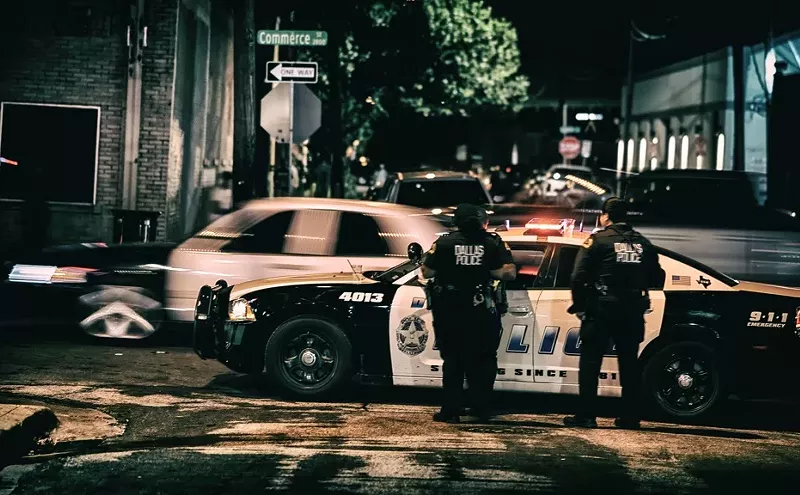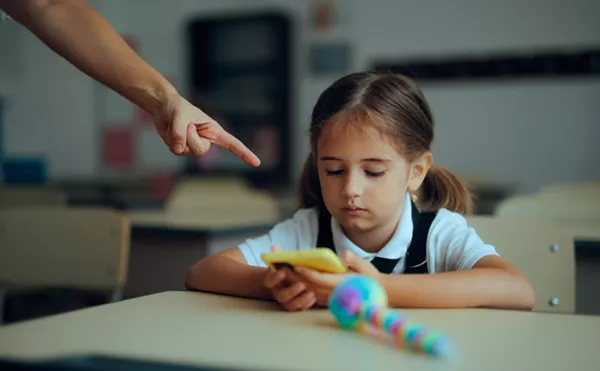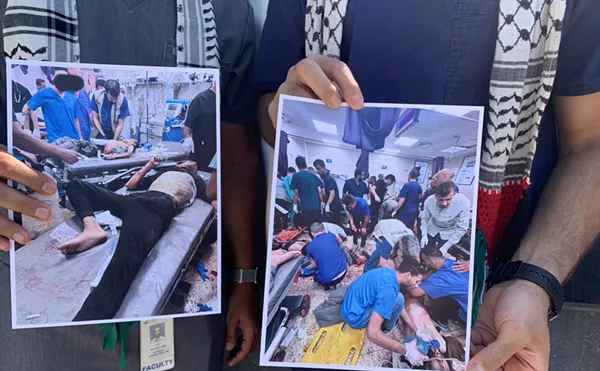The home of Sam and Kathy Krasniqi has one distinguishing feature: rain or shine, several pairs
of men's and women's shoes can be found lined up on the porch next to a mat that says, "Friends Are Always Welcome."
These shoes are just one symbol of the Krasniqis' faith. Muslims, they explain, never wear shoes inside a mosque or in their homes because both are holy places that must be kept scrupulously clean or their prayers will be invalidated. This is also why the Krasniqis do not allow pork to be cooked or eaten in their house.
Immigrants from an Albanian region of what was once Yugoslavia, Kathy and Sam Krasniqi sit barefoot in the back den of their darkened, four-bedroom house. Tears run down their faces as they watch grainy videotapes of their two children, the only tangible connection the couple still has to their 10-year-old daughter, Lima, and 14-year-old son, Tim.
For the past five years, Tim and Lima have lived together in a series of foster care placements around the state, after a jury in a Dallas County family court terminated the Krasniqis' parental rights--the court's equivalent of the death penalty for a family.
This harsh--and irreversible--punishment came at the end of a strange case that began in 1989 when several witnesses reported seeing Krasniqi fondle his daughter during a karate tournament in a Plano high school gymnasium in which his son was competing.
Several years after the family court ruling, Krasniqi finally had his day in criminal court. Collin County Judge Nathan White acquitted him of the charge of indecency with a child primarily on the strength of testimony from Massachusetts anthropologist Barbara Halpern--one of the country's foremost authorities on the peasant culture of the Balkans.
Halpern explained that Sam Krasniqi's actions were done not with sexual intent, but rather with playful affection--in keeping with his culture, which cherishes children and showers them with physical affection.
But it was an empty victory for the Krasniqis, whose children, by then, were lost to them forever.
"If I am danger, why am I not punished, why am I not in prison, but my children are?" a bewildered Sam Krasniqi asks as he wipes tears from his eyes with the back of his hand.
The Krasniqis believe their children are indeed prisoners--prisoners of the Texas Department of Protective and Regulatory Services.
The state agency (known as the Department of Human Services when the case began) is charged with protecting children's best interests, but the Krasniqis say it unfairly took their children away. Child Protective Services placed the terrified Krasniqi children--who had never even been left with a baby-sitter before--in a series of group homes and foster families, none of whom ever gave the slightest consideration to the children's ethnic and religious heritage.
Today, Tim and Lima are being raised by a Christian family. They are being taught to accept Jesus Christ as their savior and eat pork. They are destined to forget they ever had another family, another faith, and another language.
The videotapes that Sam and Kathy Krasniqi watch show a mother's valiant attempts to stay connected to her children, to keep them tied to their family of origin, to their culture, and to their religion.
The videotapes were taken during visits Kathy was allowed to make with her children every two months in an office--guarded by a police officer--inside the Texas Department of Human Services building on Maple Avenue in Dallas.
State District Court Judge Hal Gaither made the rare decision to allow the visits after the Krasniqis' parental rights were terminated in June 1990, 10 months after the incident at the karate tournament. The visits began in late fall 1991 and continued through the spring of 1993, when the Krasniqis' appeals of the termination were exhausted.
In the videotaped visits, Kathy brings Tim and Lima the ethnic foods--petla and peta--she used to make them at home. In addition to toys and games and clothes, Kathy also brings pizza from one of the several Brother's Pizza Restaurants the Krasniqi family owned in Dallas--before their mounting legal expenses forced them sell their once-thriving business.
She brings them large stacks of pictures of family members and friends. "Do you look at the pictures, Lima, when you miss mommy?" Kathy asks. Lima nods, then curls into her lap while Kathy tells her and Tim the stories of the day they were each born.
Each visit ends with Tim and Lima looking into the camera and saying good-bye to their father, who they call "babi," Albanian for daddy. And before Kathy leaves, they beg to know the date of the next visit.
But as the years have stretched on, later tapes record how familial bonds and memories fray. In tapes taken a year and a half ago, the children strain to remember Albanian--the only language they ever spoke in their home. They forget the names of cousins and even the Albanian first names of their mother and father: Sadri and Sabhete.
The tapes also capture the sadness and confusion the children feel being caught between two cultures.
During one visit, in the early 1990s, the children show up wearing crosses. They confess to Kathy that their foster parents take them to church three times a week, where they sing and pray to Jesus.
At a following visit, held June 25, 1992, after a psychologist appointed by the court to supervise the visits complains to DHS, the crosses are gone from the children's necks, yet Tim is wearing a T-shirt that proclaims "Jesus is in control."
As Kathy tries to talk to her children about their Muslim faith, explaining the holy month of Ramadan when Muslims fast every day until sundown, Lima suddenly breaks into sobs.
"Don't cry, Lima," Kathy says, stroking her daughter's long silky black hair. "Tell mama why you cry?"
Slowly Lima confesses that in her foster parents' home she has eaten pepperoni, which contains pork. Choking back the tears, she says she is afraid her mother will be angry.
"Don't worry," Kathy reassures her. "Do you know how much mama loves you?"
Lima nods her head yes. "A lot," she says.
It has been a year and a half since Kathy last saw her children. The Krasniqis have learned that one of their greatest fears has been realized--their children have been converted to Christianity.
The last shred of the life Lima and Tim once knew, the last link to their parents, has been broken. Last week, the Krasniqis were devastated to learn their children were formally adopted by their Christian foster parents two weeks ago. The news came, not from child welfare authorities, but from an Observer reporter who learned of the adoption while checking facts.
From the very beginning, the Krasniqis pleaded with workers in the child welfare system to be sensitive to their children's Muslim identity. But even though the agency professes to value family heritage, little was done in this regard.
When the state first put Tim and Lima in protective custody in March 1990, they were placed in the Buckner Baptist Children's Home in East Dallas, where they were taken to revival meetings. When Kathy and Krasniqi visited during that time, their children asked them if they had accepted Jesus Christ as their savior. When the Krasniqis complained to the children's caseworker, their attendance at the ongoing revival was "limited somewhat," according to DHS records.
Jan DeLipsey, the psychologist who supervised Kathy Krasniqi's visits with her children, wrote to the court and described her personal distress at the system's disregard for the children's heritage and religion. According to an affidavit she filed with the family court, she asked the children's caseworker--the third they had had in as many years--whether he had investigated placing the children with Kathy Krasniqi's brother in New York, who knew the children and had expressed interest in adopting them.
"I have not, and would never, investigate relative placement in this case, because these people always stay together," was the caseworker's reply.
Marc Richman, a Dallas attorney whose office helped handle the Krasniqis' legal appeal of the parental rights termination verdict, attempted to raise the adoption issue with Winfield Scott, the guardian ad litem appointed by the court to represent the children's interest in legal issues.
"He didn't have the time to discuss it," Richman says. "No one seemed too concerned. If it was a Christian child who was told to forget Jesus, who was told to get on a rug and pray to Mecca, who was taken to a mosque or a synagogue, you better believe someone would be concerned. The walls would be coming down."
In the last few months, as Tim and Lima's adoption by their Christian foster family grew closer, the Krasniqis finally found a sympathetic and deeply concerned audience in the Islamic Association of North Texas, a nonprofit religious group that represents the 150,000 Muslims in North Texas.
Several prominent Dallas Muslims were outraged when they heard the Krasniqis' story. They felt the family court punishment was too harsh, especially on the mother, who was never charged with anything. They particularly were incensed at the state's total disregard for the children's background.
In recent months, Ali Sheik, a Pakistani oilman and one of the mosque members, has discussed his concerns in several meetings with Fred Seale, the Arlington-based regional director of Protective Services for Families and Children, a division of the Texas Department of Protective and Regulatory Services. Sheik says Seale has admitted his department made a mistake and plans to rectify it as best they can. In the future, for example, incoming caseworkers will be taught about the Muslim faith.
In addition, Sheik says that Seale also told him that several caseworkers have researched Islam at the library at Southern Methodist University and plan to make the information available to Tim and Lima--if they want it. Seale told the Observer he could not discuss specific cases. The Islamic Association felt Seale's response falls far short of protecting the children's culture and religion.
In late October, the Krasniqis and several members of the Islamic Association filed a motion on behalf of the Krasniqi children, asking the court to replace the children's guardian ad litem with Khalid Hamideh, a Dallas lawyer who represents the Islamic Association of North Texas and has served many times as a guardian ad litem to children of the Muslim faith.
"We hope it is not too late to bring these children back to the religion and culture and heritage of their forefathers," says Hamideh. "The best these parents can hope for is that their children be adopted by a Muslim family who will give them proper teachings, to reverse the damage that has been done, so when they become adults they will want to know about their parents, to be around their parents and their culture and their religion that has been taken away from them out of ignorance and bias."
Present guardian Winfield Scott would not comment, citing the pending litigation.
The hearing on the motion to change the guardian ad litem is set for November 21. Just two weeks before the scheduled hearing, however, the children were officially adopted by their foster parents.
"It's very clear to me that the adoption proceeded post haste after we filed a motion for a hearing," says Gary Noble, the lawyer presently representing the Krasniqis. "DHS and the guardian ad litem were given notice of the hearing and proceeded with the adoption in an attempt to keep a lid on the facts we were going to bring out in the hearing."
As far as Noble and the Islamic Association know, the hearing will go on as planned. In addition, the Krasniqis are preparing to challenge the adoption and to sue DHS "for negligently and maliciously disenfranchising the children from their religious heritage."
The Krasniqis know all of these legal maneuvers are a desperate attempt to restore to the children what has been taken from them, to provide them a voice which was denied them throughout all the proceedings.
They also know that it is unlikely they will ever get Tim and Lima back. But they hope that somehow they can at least regain contact with their children and perhaps reconnect them with their religion and culture. A heritage lost in what anthropologist Barbara Halpern calls "a tragic cultural miscommunication."
Sadri Krasniqi was born 56 years ago in Yugoslavia, an ethnic mosaic composed of six republics that were gerrymandered into a country at the negotiating table of Versailles after World War I.
The Krasniqi clan lived in an autonomous Albanian region within the Serbian republic, called Kosovo. Ethnic and religious ties run deep in this part of the world, and so do centuries-old animosities, which roiled into bloody warfare several years ago, catapulting this little-known region into front-page news.
But even before ethnic bloodshed focused the world's attention on the region, anthropologists had found it a fascinating area of study, particularly the Krasniqis' Kosovo. Kosovo, more than any other part of the Balkans, clings to a value system with ancient roots, where marriages are arranged, several generations often live under one roof, and where unwritten medieval codes prevail. The concept of honor and shame are very strong in this subculture. Vendettas and blood feuds are an integral part of this world.
In the village, men's and women's lives are lived in separate social spheres and certain taboos prevail. A woman, for instance, would never kiss her husband in front of her father.
Sam Krasniqi lived his childhood in a village near Pec, venturing out only after high school to attend his country's equivalent of a trade school. Good jobs were scarce in Kosovo, a particularly depressed region of Yugoslavia, where industrial development came slowly.
For several years Krasniqi was a bureaucrat in the communist government, investigating worker's compensation claims. He spent the next 10 years as a police officer in his village, where his brother served as chief of police. As is common in his native region, Krasniqi had to leave if he could ever hope to support a family.
In 1971, at the age of 30, Krasniqi arrived in Chicago. He worked 18 hours a day at two jobs; he was a punch press operator at Zenith radio and was chief superintendent of a high-rise condominium. After leaving Zenith, he worked for a janitorial firm. In 1979, when he saved enough money to start his own business, he returned to Yugoslavia, where his parents had chosen a bride for him.
All he knew about Sabhete Goga--15 years his junior--was that she was from a different village in Yugoslavia and that her parents made sure she was from a good family and a good background. As is the custom, Sabhete, or Kathy, was still living at home, though she was in her mid-20s; her mother had died when she was eight and she looked after her father. Krasniqi and Kathy had only a few months to get to know each other before they married and returned to Chicago.
In 1980, the Krasniqis' first child was born. They named him Urtim and, in a concession to their new culture, called him Tim. Shortly after, the Krasniqis moved to Dallas and Krasniqi went into the pizza business. In 1984, Lima was born and as their family grew, so did their prosperity. By the late 1980s, Krasniqi would own as many as five Brother's Pizza restaurants from Mesquite to Arlington, from the West End to a North Dallas location near Valley View Mall--the one at which he and his wife worked.
Friends and business associates of Krasniqi's describe him as a devoted father and a hard-working businessman, at times stubborn and headstrong, but trustworthy. "If all my clients were like him, I wouldn't have any banking problems," Mito Miteff, a Fort Worth lawyer and banker of Albanian descent testified on Krasniqi's behalf in the 1990 family court trial. Miteff's bank had lent Krasniqi money on several occasions to finance his businesses and he never missed a loan payment, Miteff said.
By the late 1980s, the Krasniqis owned a Mercedes Benz and a four-bedroom house on Keller Springs Road.
Even as they plunged into the economic system, the Krasniqis cleaved to their ethnic heritage. They spoke Albanian in their home--and with their children--and socialized only with other Yugoslavs. Their grasp of the English language was poor, limited to what they needed to run their pizza parlors.
Their lives revolved around the children, which was very much in keeping with their village backgrounds. Kathy remained at home with Tim and Lima until they were ready for kindergarten. "I never knew what this meant--babysitter," she says, shaking her head. On Saturdays, when Kathy had to work in the restaurant, she took Tim and Lima with her.
Confronted with a new culture, Krasniqi sought stability in his traditional code of honor. In the mid-1980s, a Garland arson investigator trying to get to the bottom of a series of arson-for-profits in the Dallas-Fort Worth area allegedly done by several Yugoslavs came to Krasniqi. Krasniqi, a cop for a decade in his village, knew several of the men and volunteered all the information he had about the crimes and risked retaliation by testifying for the prosecution in at least one trial.
Krasniqi, according to his lawyer, also provided information to the federal Bureau of Alcohol Tobacco and Firearms about a Yugoslav ring of gun and drug traffickers, who were suspected of running weapons back to Yugoslavia.
In the late 1980s, in a case of mistaken identities, Krasniqi was questioned as a possible suspect in the murder of a Chicago police officer. Krasniqi convinced the authorities he was not their man. Then with the assistance of his police chief brother back in Kosovo, Krasniqi helped the FBI find the more likely suspect--a man with the same last name and first initial as Sam Krasniqi, according to Krasniqi's former lawyer, Marc Richman, who spoke to agents about the case. [Citing its policy of confidentiality, the FBI would not discuss the case with the Observer.]
"When I am asked for help, I help as much as I can," Krasniqi says. "It is my honor to help."
On Saturday morning, August 12, 1989, Tim Krasniqi begged his father to attend his karate tournament. In the two years that the 9-year-old had been taking karate lessons, his father never had seen him compete. Tournaments were always held on Saturday, Krasniqi's busiest work day.
This time, Krasniqi gave in. Lima, 4 1/2, changed into her prettiest dress--a red sailor dress--and put on plastic dress-up slippers. In Kosovo, when children are taken out in public, they are always dressed in their best. Krasniqi packed up his video camera and headed off with his son and daughter to Shepton High School in Plano.
The tournament started at 11 a.m. and Krasniqi and Lima sat in the front row, to be as close as possible to Tim when he competed. Sitting one row above them, and a few feet to the right, was Mary Lou Taylor, a mother from Coppell, who was in the stands that day to watch her two children and husband compete in the tournament.
Shortly after the tournament began, Taylor's attention was drawn to the spectator in front of her. She watched as a 50-year-old man with thinning gray hair repeatedly rubbed the underpants-clad buttocks and bare legs of a little girl who was laid out across his lap. He also slipped his hand under the girl's panties and caressed and squeezed her buttocks.
"He lifted her to face him and rubbed her front chest under her little dress. He then put his hand inside her panties from the leg opening and squeezed her vagina," Taylor wrote in a statement she gave police.
Taylor called 911.
A police dispatcher in training was sent to meet the woman, because she was in plainclothes. The dispatcher watched Krasniqi and Lima from across the gym and, according to her testimony, saw Krasniqi put his hands in Lima's underwear. The dispatcher informed an undercover police officer who had arrived what she had seen, and he sat behind Krasniqi and corroborated the dispatcher's story. Two uniformed police officers placed Krasniqi under arrest and took him and Lima and Tim to the Plano police department, where the children were put in the protective custody of the Department of Human Services.
The authorities had the rarest commodity of all in child molestation cases--witnesses. From the outset of this case, it seemed police and welfare workers suspected the worst.
Mike Johnson, the Plano police officer assigned to the case, would confide in state caseworkers that he thought Krasniqi might be into pornography. His reasons: Krasniqi had a video camera with him (the tape, it turned out, was of a Yugoslav birthday celebration at the pizza parlor) and that Krasniqi grinned when he was arrested. "Det. Johnson said the man seemed to get a charge out of everyone seeing him molest the child and then see him get arrested," according to the notes of a Child Protective Services caseworker.
A Collin County child welfare worker named Lisa Black videotaped an interview with Lima and Tim. Sitting in a police department office, hugging a stuffed animal, Lima tells Black in the tape that her father has touched her on her "rushka" (an Albanian pet name for genitalia), but never under her clothes.
The tape of Tim's interview could not be located, but according to Black's notes, Tim had seen his father touch his sister on her private parts on several occasions. "He stated his father tickles Lima on her private parts and she likes it. When questioned further, Tim revealed his father also touches him on his private parts...at his house...Tim stated he doesn't mind his father doing this."
Charged with sexual abuse of a child, Krasniqi's bond was set at $25,000. Krasniqi remained in jail over the weekend, while Kathy tried to make sense of what had happened.
"If you live in Albania 1,000 years, you'd never hear such a thing, someone having sex with a child," says Kathy, in a recent interview. "If I ever caught my husband doing such a thing with his fingers, putting them inside our daughter, he wouldn't have those fingers anymore."
On Monday afternoon, while Krasniqi remained in jail, two caseworkers from Dallas County Child Protective Services arrived unannounced at the Krasniqis' home. According to her case notes, Meredith Wunderlich, the primary person assigned to the case, was struck by several things upon entering Kathy's home--how immaculate it was and that Tim was in his underwear at 4:30 in the afternoon and how Tim and Lima shared a bedroom, despite the house having four.
Had she asked, Wunderlich--three years out of college with her B.A. in social work and no children of her own--would have learned that there are religious reasons for keeping a Muslim home so clean. Also, that Tim was about to change into his karate uniform and that Tim and Lima shared a bedroom, because, until very recently, their two cousins and uncle had lived with them.
Wunderlich, who did not retrun calls to the Observer, had to explain to Kathy what molestation meant. "If you mean something sexual like with me and my husband, you are wrong," Kathy responded.
"It is not a sexual thing and there is no harm to my children," Kathy told Wunderlich. Kathy also apparently had no idea what the Department of Human Services was nor how they worked.
Wunderlich took Lima into her bedroom to interview her. "Tears welled up in her eyes because she was obviously nervous about what was about to be said," according to Wunderlich's notes. Lima did not want to talk about events at the karate tournament, although Wunderlich tried to prod her by reminding her "that was the day your father was arrested for doing some bad things to you." Lima did tell Wunderlich that her father had touched her in her home on her breasts and vagina, which she pointed to with her finger. Asked whether she had seen her father touch her brother on his private parts, Lima said one time.
The other caseworker took Tim into the back den to question him. According to the caseworker's affidavit, Tim told her his father had rubbed his private parts over his underwear on at least one occasion.
"I tried over and over to explain to Kathy that there was no question in my mind that her children had been sexually abused," Wunderlich wrote.
Over the phone, Wunderlich and her supervisor decided the children should be placed in a foster care setting--"some place where they would be well cared for, looked after, and believed," Wunderlich noted. "I told her it would not necessarily be a permanent placement."
"One hour away from my children would be too long," Kathy interjected.
Fumbling around for her keys and purse, Kathy demanded her children come to her. The children were crying and the caseworkers went over to them. Tim yelled out, "I didn't know, I didn't know it was wrong." Kathy begged the caseworkers to leave. Then, holding onto her children, Kathy dashed out the back door to the garage and sped away.
Kathy and the children returned an hour later to find the police at their home. Unfamiliar with Child Protective Service procedures, the police told the caseworkers they had to leave.
"I told Kathy that this was not the end of my involvement...and she would be seeing me again," Wunderlich wrote in her notes.
The following day, a Tuesday, Sam Krasniqi, whose lawyer had cautioned him against talking to police, agreed to talk with Wunderlich, who told Krasniqi she wanted to help his family. According to Wunderlich's case notes, he admitted touching Lima and Tim, that it was acceptable in his country and it was just a big misunderstanding. "He denied it was sexual at all and said that I could kill him if he was lying and if it was sexually gratifying to him."
Krasniqi has since insisted that Wunderlich misconstrued what he was telling her. At the karate tournament, Krasniqi insists he was just playing a game with his daughter--touching the parts of her body and asking her to say their names.
"I tell Wunderlich, How can you love your children and not touch them?"Krasniqi explains, sitting in his home, surrounded by pictures of his children when they were younger.
Nowhere in Wunderlich's case notes does it indicate that anyone in her department tried to research the Krasniqis' culture. If they had they might have learned what Barbara Halpern, the anthropologist from Massachusetts, testified to in Krasniqi's criminal trial. The Krasniqis come from "very physically demonstrative culture. Children are universally adored. Until they attain school age and venture beyond the household gates, they are the constant subjects of hugs, caresses and overt displays of affection."
Alarmed by her interview with Krasniqi, Wunderlich was even more determined to remove the children from their home. She got a court order and, after talking with her attorney, Kathy surrendered them to DHS.
The children spent 10 days in the home of foster parents--a terrifying experience. The children would later tell their parents and the caseworker that the foster mother brandished a knife and yelled at Tim because he got out of bed to get a glass of water.
On August 23, the Krasniqi family had a hearing in the Dallas County courthouse as required by law. Wunderlich was represented by her supervisor, Carol Duncan, who recommended that the children be returned to their mother, because the children had been so emotionally stressed by the foster care placement.
The court ordered the family into DHS-sponsored group treatment. Sam Krasniqi was barred temporarily from any contact with the children.
Continued...
Info:












